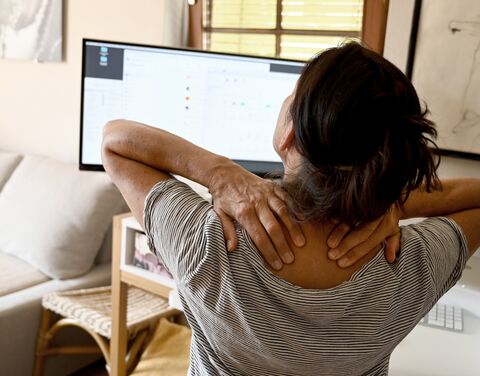
For many, working from home is increasingly becoming a health burden: Back and neck pain, problems setting boundaries, and stress are some of the frequent side effects of the changed working conditions. AXA health expert Esther Graf knows these problems and how to solve them.
For the past few weeks, a large share of employees in Switzerland have returned to working from home, and will probably continue to do so for a while to come. Especially in the cold and dark winter months, however, many employees increasingly perceive working from home as a burden. “Regardless of whether you are working in an office you set up yourself in your home or at the kitchen table, working from home for months at a time can strain your physical and psychological health,” explains Esther Graf from Corporate Health Management of AXA Switzerland.
“Generally speaking, there is nothing wrong with new and flexible working models – on the contrary. The positive effect of working from home on the motivation and productivity of employees was proven even before the pandemic,” Graf adds. In particular, people appreciate not having to commute and the quiet environment at home. On the other hand, working from home requires a high level of responsibility from employees and a healthy dose of trust from employers: The work environment changes, professional activities are carried out in private households, and the spacial distance between employees and their line managers increases.
The impact of the changed working conditions can also be felt at AXA. The company has relied on flexible work models for years, but since March 2020, the majority of AXA employees have been working from home. “We have observed an increase in queries from our employees for our internal Employee Care Team,” Esther Graf says. The most commonly indicated physical problems are due to a lack of exercise and to equipment that is not sufficiently ergonomic. On a psychological level, the lack of boundaries and the resulting stress are the most frequently reported issues. Recently, there were also a handful of employees who indicated that they had tested positive for the coronavirus and felt guilty because they may have infected other people. “In such cases, it is important to listen to those affected and to give them the chance to talk openly about this – obviously taboo – aspect of the pandemic. The combination of isolation and feelings of guilt can be extremely difficult to manage for those affected,” explains Esther Graf.
More frequent, however, are queries regarding back and neck problems. In principle: The better the workspace is equipped, the lower the risk for physical disorders: According to Graf, “An ergonomically designed workspace is essential for preventing posture problems with longer-term effects.” “A lack of exercise, especially now in the winter, compounds the issue.” The inhibition threshold to go out in the cold temperatures is significantly higher than in the summer. Nevertheless, the health expert recommends getting some fresh air even in wind and unpleasant weather to fill up on vitamin D. “To do so, you must deliberately integrate breaks into your day that you don’t spend indoors and so that you get to 10,000 steps.” A pedometer or a smartphone in your pocket can help you with counting.
If you stay inside your home anyway, then you should plan brief breaks for exercise and movement, for example for yoga, pilates, or zumba.
“In addition, I recommend everyone working from home – as trivial as it may sound – to listen to your body, boost your immune system, eat a healthy diet, and get enough sleep,” Esther Graf explains. This is ultimately well known advice, but now it is especially important to remember it as working from home on a permanent basis is likely to shape our lives well into the future.
Besides the physical side effects, the effects on your psyche shouldn’t be underestimated. Esther Graf sees a great need for action when it comes to the issue of setting boundaries: “We see that, when working from home, the line between private life and working life is becoming increasingly blurred, which of course has to do with the lack of spatial separation. People read emails at breakfast and use their lunch break for phone calls. As a result, thoughts about the morning meeting are still going around in their heads, even if the laptop has long since been turned off in the evening,” the expert explains.
Non-stop availability and the associated stress are the greatest risks for the health of employees, which can in turn manifest themselves in physical problems such as sleep disorders. Esther Graf advises creating a clearly structured daily routine and deliberately including rituals, for example a regular walk after work to signal to the body that the work day is over.
And lastly, the psychological strain has increased as a result of reduced social contact. Even though virtual meetings are no complete substitute for physical meetings, it is tremendously important to exchange ideas with colleagues via video calls, even if there is no business to discuss. “A virtual Christmas drinks reception or coffee break with a few people, during which you can laugh or vent, are really important for your psychological wellbeing,” Graf emphasizes.